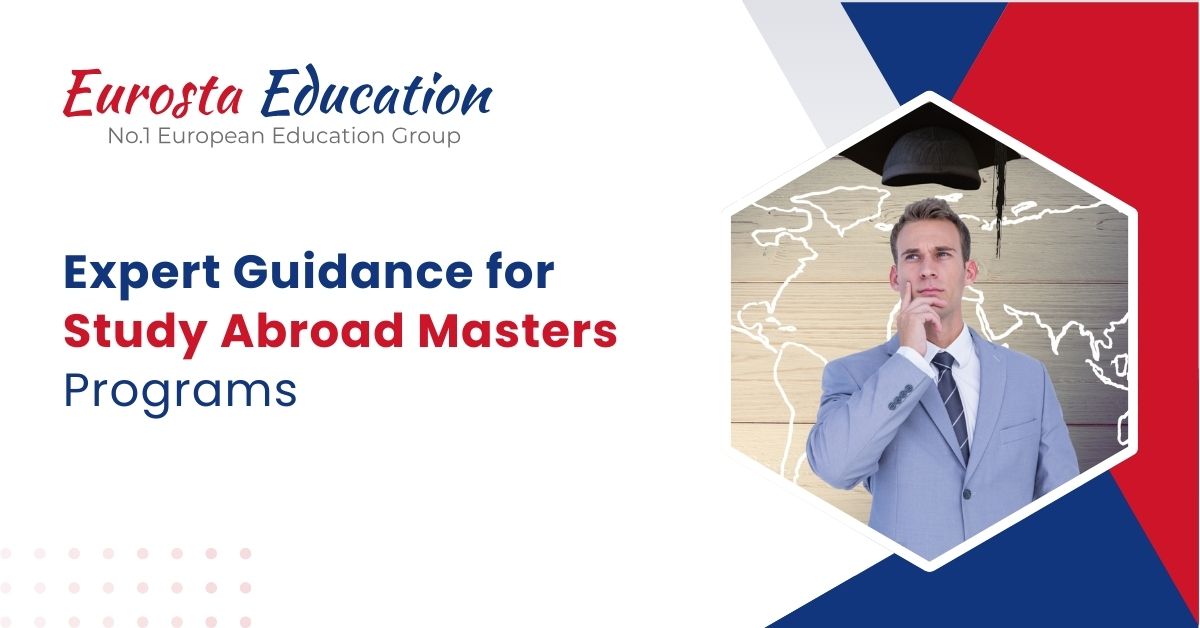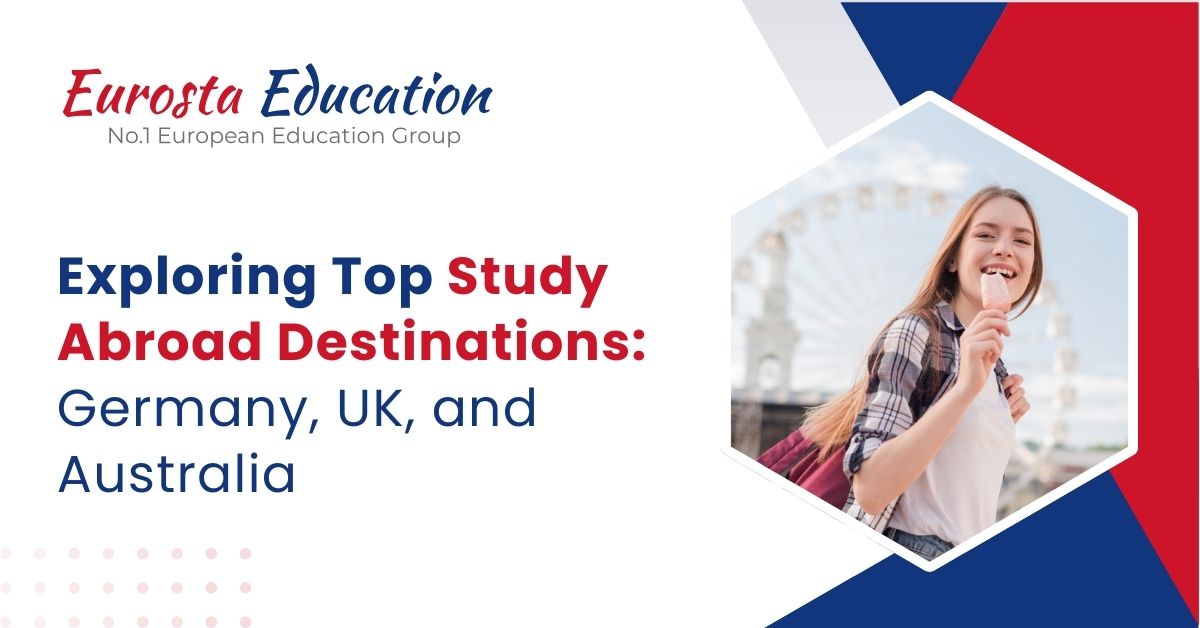The UK is renowned for its prestigious educational institutions and diverse range of courses. Among…

Expert Guidance for Study Abroad Masters Programs
Pursuing a master’s degree abroad is a life-changing opportunity that provides advanced education, deep cultural immersion, and access to global career prospects. However, navigating the complexities of international graduate programs requires careful planning and expert guidance. In this blog, we’ll explore how to effectively choose and apply for study abroad master’s programs, also known as “Study Abroad Masters,” with insights from top education abroad counselling centers.
Understanding the Value of a Master’s Degree Abroad
Why Pursue a Master’s Degree Abroad?
Studying for a master’s degree abroad offers numerous benefits that extend beyond academic excellence. Here are a few key advantages:
Global Perspective: Exposure to diverse cultures and educational methodologies broadens your worldview.
Top-Tier Education: Many universities abroad are renowned for their advanced research facilities and cutting-edge programs.
Career Opportunities: An international degree can enhance your employability and open doors to global career prospects.
Networking: Studying abroad allows you to connect with a diverse network of professionals and academics, enriching your personal and professional life.
Selecting the Right Program and University
Choosing the right master’s program and university requires careful consideration. Here’s how to make an informed decision:
Identify Your Academic and Career Goals
Before selecting a program, define your academic and career goals. What specific knowledge or skills do you wish to acquire? Are you targeting a career in academia, industry, or a specific specialized field? Aligning your program choice with your goals ensures that you choose a course that will support your future aspirations.
Research Potential Universities
Investigate universities that offer strong programs in your field of interest. Consider factors such as faculty expertise, research opportunities, and campus facilities. University rankings, though useful, should be balanced with program-specific details and personal preferences.
Evaluate Program Curriculum
Review the curriculum of potential programs to ensure it covers the topics and skills you need. Look for programs that offer flexibility in course selection, practical experience, and opportunities for research or internships.
Navigating the Application Process
Seeking Expert Guidance from Education Abroad Counselling Centers
Applying for a master’s program abroad involves several steps, from gathering documents to meeting deadlines. Education abroad counselling centers provide invaluable support throughout this process. Here’s how they can assist you:
Application Assistance
Counselling centers help with every aspect of the application process, including:
- Document Preparation: Ensuring that your academic transcripts, letters of recommendation, and personal statements meet the requirements of your chosen universities.
- Application Forms: Guiding you through the completion of application forms and ensuring accuracy and completeness.
- Deadlines: Keeping track of deadlines and ensuring timely submission of all required documents.
Personal Statement and Recommendation Letters
Creating a persuasive personal statement and obtaining robust recommendation letters are essential components of your application. Counselling centers offer guidance on writing a persuasive personal statement and choosing appropriate referees.
Interview Preparation
Certain programs might include interviews as part of their selection process. Counselling centers can help you prepare by conducting mock interviews and providing feedback to improve your performance.
Understanding Financial Considerations
Studying abroad can be expensive, so understanding the financial aspects is essential. Here’s where expert guidance can help:
Tuition Fees and Living Costs
Counselling centers can provide information on tuition fees and living costs in different countries and universities. This helps you budget effectively and plan for expenses.
Scholarships and Financial Aid
Numerous universities and organizations provide scholarships and financial aid for international students. Counselling centers can assist in identifying and applying for relevant scholarships and grants.
Preparing for Departure
Pre-Departure Briefings and Cultural Adaptation
Before you embark on your study abroad journey, it’s important to prepare for life in a new country. Education abroad counselling centers often provide pre-departure briefings that cover:
- Cultural Adaptation: Tips for adapting to a new culture and environment, including language, social norms, and daily life.
- Accommodation: Guidance on finding and securing accommodation.
- Health and Safety: Information on health insurance, safety tips, and emergency contacts.
Frequently Asked Questions
What factors should I consider when choosing a master’s program abroad?
When choosing a master’s program abroad, consider factors such as the program’s curriculum, faculty expertise, university rankings, and research opportunities. Evaluate how well the program aligns with your career goals and academic interests. Additionally, consider the location, cost of living, and cultural aspects of the host country. Expert guidance from a study abroad consultant can help you weigh these factors effectively.
How can a study abroad consultant help me with my master’s program application?
A study abroad consultant can provide invaluable assistance with your master’s program application by offering personalized advice on program selection, helping you prepare and refine your application documents, such as personal statements and CVs, and ensuring that all application requirements are met. They can also guide you through the submission process and help you address any issues that arise during the application.
What should be included in a strong personal statement for a master’s program?
A strong personal statement should include a clear explanation of your academic background, career goals, and why you are interested in the specific program and university. It should highlight your relevant experiences, skills, and achievements, and demonstrate how the program aligns with your aspirations. Consulting with experts can help you craft a compelling personal statement that stands out to admissions committees.
How do I prepare for interviews as part of the application process?
Preparing for interviews involves researching common interview questions, understanding the program and university’s expectations, and practicing your responses. Focus on articulating your academic achievements, career objectives, and reasons for choosing the program. Role-playing with a mentor or consultant can also help you build confidence and improve your interview performance.
What financial aid options are available for international master’s programs?
Financial aid options for international master’s programs include scholarships, grants, and student loans. Many universities offer scholarships specifically for international students, while external organizations and government programs may also provide funding. Consult with a study abroad advisor to explore these options and understand the application process for each type of financial aid.
Conclusion
Embarking on a master’s program abroad is a significant and rewarding endeavor. With expert guidance from education abroad counselling centers, you can navigate the complexities of choosing the right program, managing the application process, and preparing for your international experience. By taking a proactive approach and utilizing available resources, you’ll be well-equipped to achieve your academic and career goals while enjoying a transformative global experience.




